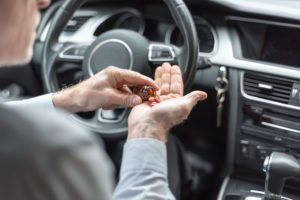
When you think of a DUI, you probably imagine a drunk driver behind the wheel of a car, but DUI actually stands for Driving Under the Influence, so any substance that affects your ability to safely drive a car can lead you down the path of a DUI. As the law states, you are considered under the influence if a substance inhibits a person from possessing the “clearness of intellect and control” that they normally would. As you might have guessed, substances like drugs fall into this category.
However, drugged driving in Minnesota is a little different than drunk driving. Today, we take a closer look at what constitutes drugged driving in Minnesota, and what potential penalties you might face.
Drugged Driving Law in Minnesota
As you might have guessed, the laws regarding what constitutes drugged driving are a little more defined since a standardized test, like a breathalyzer for alcohol, does not exist. In Minnesota, a person can be arrested for driving under the influence if they are found to be in control of a motor vehicle:
- Under the influence of a “controlled substance.”
- Knowingly under the influence of a “hazardous substance” that impacts the driver’s ability to safely operate the vehicle. Some hazardous substances include household products like aerosol spray and paint thinners, which are sometimes used to get high.
- Operating a vehicle with a schedule I or schedule II controlled substance (other than marijuana) in the body.
Some of the substances listed as schedule I or schedule II drugs include cocaine, codeine, morphine, oxycodone, methadone, ecstasy, LSD and heroin.
Drugged Driving Penalties and Defenses
If you are charged with operating a vehicle under the influence, you can face the following penalties in Minnesota:
- Up to 90 days in jail.
- Fines up to $1,000.
- Up to 180 days of license suspension, which becomes mandatory if the defendant refuses the chemical test.
A first offense for drugged driving is considered a misdemeanor offense, but that’s assuming you don’t get in an accident or injure yourself or another person. Consequences for subsequent violations increase in severity, as a second offense results in a mandatory 30-day jail sentence (two days in facility, then can be altered to eight hours of community service in exchange one day off your jail sentence). You’ll also face a one-year license suspension. A third offense results in 90 days of incarceration, with a similar community service deal after six days, and a two-year license suspension, on top of hefty fines.
As you can see, a drugged driving DUI charge is serious, but there are a few different ways we challenge these cases. We may challenge that:
- You legally took the prescription drug, and you were not under the influence at the time of arrest, even though it was in your bloodstream.
- You unknowingly took the substance.
- The traffic stop was invalid or illegal.
- There was a problem with chemical testing.
- Your rights were infringed upon by the police.
- You did not know the prescription would have that effect on your body.
These are just a few ways we can work to challenge your case, but to have a more specific plan for winning your drugged driving case, reach out to Appelman Law Firm today.





